- Home
- Tony Hillerman
The Blessing Way Page 14
The Blessing Way Read online
Page 14
Behind him the horse snorted and stamped, fighting off the flies.
“Horse,” Leaphorn said, “it comes out just the way we figured it would.”
Leaphorn rose from his squat and brushed a fly from the horse’s back. There was no trace left of the nagging sense of wrongness and urgency that had dogged him for days, none of that vague, undefined feeling that something unnatural and evil was afoot in his territory. He understood now. It was a good feeling.
And then Lieutenant Joe Leaphorn took two short steps across the small place of soft, loamy earth and looked down at the older tracks. He recorded the fact that they had been dimmed by at least one rain shower. He noticed that this set, too, varied in the depth the rear tires had cut. It had taken, Leaphorn thought at first, two trips to haul down the remains of the shattered rocket. A split second later his mind processed what his eyes were seeing. On this round trip, the Land-Rover had carried its heavy load on the way up—not on the way down.
The Navajo language is too specific and precise to lend itself to effective profanity. Leaphorn cursed in Spanish and then—at length—in English.
It took Leaphorn almost three hours to piece together as much as he could of what had happened on this ridge and on the mesa to which it led. He worked methodically and carefully, resisting an urge to hurry. And when he put it all together, he had nothing but another enigma which offered no possibility of solution.
To Leaphorn’s surprise the Land-Rover had approached the saddle from the southeast, emerging from the Chinle Desert from the direction of the Lukachukai ramparts. On the first trip up—perhaps as long as a month earlier—it had carried a heavy load over its rear axle. At several places the driver had stopped to cut brush out of the way, sometimes using an ax and sometimes a power chain saw. To traverse the steepest slope, where the saddle rose sharply to the lip of the mesa rimrock, he had used a winch line in several places to help pull the vehicle up. Once on top, the vehicle had driven fairly directly about a mile across the mesa. There something heavy and metallic had been unloaded on a flat outcropping of sandstone, scoring the soft rock. From this point, the Land-Rover had made a backing turn and driven directly back over the original track.
Even though the other tracks were weeks fresher, he had spent most of the time sorting out the second trip. He finally concluded that on this trip the Land-Rover had driven directly to the sandstone outcropping. Then it had returned to the rim where the saddle joined the mesa. There several small trees had been cut and a score of boulders moved, apparently to clear a better roadway. At the site of this heavy work, Leaphorn found the tracks of Billy Nez’s rubber-soled sneakers, marks of the Big Navajo’s flat-heeled boots, a bread wrapper, and an empty Vienna sausage can. After Billy Nez had been here—and presumably after he had left with the Big Navajo’s stolen hat—the Land-Rover had driven back over the rim and back to the sandstone. There the heavy object had been reloaded and the Land-Rover had driven down off the mesa. This much was clear. Leaphorn had found three ponderosa poles used as a tripod, which must have supported the pulley used to lift whatever it was the Big Navajo had unloaded and then reloaded.
Leaphorn rubbed his fingertips over his forehead, trying to recreate exactly what the Big Navajo had done on that second visit to the Ceniza Mesa.
He had first driven to the heavy object. And what then? Looked at it? Assured himself it was still there? Adjusted it? Fed it? Put fuel in it? Turned it off? Or on? No hope of guessing. And then the Big Navajo had driven back to the rim to improve the steep approach. Why? If he could winch the loaded Land-Rover up the slope he could winch it down, given enough time. Was that it? Time? Did he expect to be in a hurry coming down? Maybe, Leaphorn thought. Maybe that was it. Time. But Navajos didn’t hurry. In fact, there was no word in the Navajo language for time.
And then the Big Navajo had discovered his hat had been stolen, had found the tracks of Billy Nez, and knew someone had watched him. Knowing this, he had driven back over the top, reloaded the heavy object, and hauled it down off the mesa. Why? Maybe because Billy Nez might find it. But where had the big man taken it? And what was it?
Leaphorn stood on the mesa rimrock and stared out across the Chinle at the Lukachukai slopes. The sun was down now. The tops of the evening thunderheads over the mountains were still a dazzling sunlit white, but below the fifteen thousand-foot level they turned abruptly dark blue with shadow of oncoming night. The desert was streaked with pink, red, and purple now, the reflected afterglow from cloud formations to the west. Normally Leaphorn would have been struck by the immensity of this beauty. Now he hardly noticed it. He stared at the darkening line of the Lukachukai ramparts, searching out the points of blackness, the open mouths of the canyons which drained it. Since the Land Rover had come from the southeast, across the Chinle, it must have come from one of these. He could backtrack it. Twenty miles, he guessed. Maybe twenty-five, and a lot of it would be over bare slick rock. Even in daylight he wouldn’t average a mile an hour. At night it would be impossible.
A burrowing owl, its wings stiff, planed up from the desert below him, banked into the invisible elevator of air rising up the mesa wall. It hung on the current a few feet below him—its yellow eyes examining the rimrock for incautious rodents feeding early. Leaphorn envied its mobility. Since the moment he had seen his orderly, logical explanation of Luis Horseman’s death demolished by the hard facts of the Land-Rover’s tire tracks, the old sense of urgency had returned. He had resisted it by sheer strength of will, forcing himself to concentrate on deciphering what had happened at this mesa. Now he resisted no longer. Instead, he thought about it—turning this itching impulse to hurry in his mind. What was it that bothered him?
He laughed, and the owl, making a second and slightly higher sweep over the mesa wall, panicked at the sound. It flapped past him, trailing its chittering quick-quick-quick-quick call, and vanished in the shadows.
Everything was bothering him, Leaphorn thought. Nothing fit. Everything was irrational. But why this sense of time running out, of something dangerous?
Leaphorn lit a cigarette and smoked it slowly, thinking hard. Luis Horseman had been killed. Billy Nez had found the tracks of the Big Navajo’s Land-Rover near where Horseman had hidden. A Navajo had been killed and a Navajo had killed him—that was the presumption. Leaphorn studied this presumption, again seeking an answer to the central question. Why? Why did Navajos kill? Not as lightly as white men, because the Navajo Way made life the ultimate value and death unrelieved terror. Usually the motive for homicide on the Reservation was simple. Anger, or fear, or a mixture of both. Or a mixture of one with alcohol. Navajos did not kill with cold-blooded premeditation. Nor did they kill for profit. To do so violated the scale of values of The People. Beyond meeting simple immediate needs, the Navajo Way placed little worth on property. In fact, being richer than one’s clansmen carried with it a social stigma. It was unnatural, and therefore suspicious. From far behind him on the mesa came the voice of the owl. Ta-whoo, it said.Whoo.
Where, then, was the motive? There was something about all this that seemed strangely un-Navajo. But the big man who drove the Land-Rover was one of The People. Leaphorn was sure of that, remembering the face in Shoemaker’s. There had been times at first at Arizona State when Leaphorn had trouble with the faces of white men. He had noticed only the roundness of their eyes and their paleness and all Belacani had looked alike to him. But he had no trouble with the faces of the Dinee. The Big Man had the face and the frame of a Tuba City Navajo—heavy-boned without the delicacy and softness added by the Pueblo blood mixture. And he wore braids. The trademark of the man who held to the Navajo Way. But why were the braids so short?
Leaphorn thought about that for a moment. And abruptly he again had an answer. Not all of it. But enough to make him urge the horse down the ridgeline much faster than the tired animal wanted to move. Enough to tell him that Billy Nez, hunting his witch in the Lukachukai canyons, might actually find one to his mortal danger. Enough
to tell him that he must be at the hogan of Charley Tsosie at dawn. There he would pick up the boy’s trail. The unshod horse should be easy to follow.
Mars rose over the black outline of Ton-Chin-Lini Butte as he loped across the Chinle breaks, his mood matching the gathering darkness. He was remembering his words to the Big Navajo at Shoemaker’s—the casual words which he now was sure had caused Luis Horseman to die.
> 16 <
BERGEN MCKEE HAD been dreaming. He stood detached from himself, watching his figure moving slowly across a frozen lake, knowing with the dreamer’s omniscience that there was no water under the ice—only emptiness—and dreading the nightmare plunge which would inevitably come. And then the raucous cawing of the ravens mixed with the dream and broke it and suddenly he was awake.
He sat motionless for a second, perplexed by the dim light and the blank wall before him. Then full consciousness flooded back and with it the awareness that he was sitting, cold and stiff, on the dusty floor of a room in the Anasazi cliff dwelling.
McKee pushed his back up against the wall and looked at Ellen Leon, lying limply opposite him, face to the wall, breathing evenly in her sleep. He looked at his watch. It was almost five, which meant he had slept about six hours and that it would soon be full dawn on the mesa above the canyon. With that thought came a quick sense of urgency.
He looked at his hand, tightly wrapped now in bandage, and then glanced quickly around the room. The enclosure was much too large for living quarters. It had been built either as a communal meeting place for one of the Pueblo’s warrior secret societies or as a storeroom for grain—three stone walls built out from the face of the cliff and, like the cliff, sloping slightly inward at the top. The only way out was the way they had come in—through a crawl hole in the roof where the wall joined the cliff. And there was no way to reach the hole without the ladder—the ladder which the Big Navajo had carefully withdrawn after leaving them here.
Outside, a raven cawed again and then there was silence. McKee leaned against the wall and tried to sort it out.
Whatever was happening here was the product of meticulous planning. That was clear. Behind the brush at the foot of the cliff there had been four sections of aluminum-alloy ladder. The man called Eddie had fit them quickly together, fastened them with bolts and wing nuts, and they reached exactly from a massive sandstone block at the top of the talus slope to this shelf. If the ladder was not custom-built for the purpose, at least the bolt holes had been drilled with this cliff dwelling in mind.
And, when they had reached the top, Eddie had pulled up the ladder, and laid it carefully out of sight. The action obviously had long since become habit. It would leave anyone passing below no hint that this cleft was occupied. It was equally obvious that the peculiar hide-out had been occupied for weeks. Behind a screen of bushes which grew back from the ledge under the overhanging cliff there was all the equipment for a permanent camp—a two-burner kerosene stove, a half-dozen five-gallon cans and a tarp stretched low to the ground protecting cartons and boxes. And there had been two bedrooms. Whoever else was involved must sleep somewhere else, perhaps directing this operation from somewhere outside. From what Eddie had said, others would tell them when they could leave.
And whoever they were, they had a radio transmitter. After Eddie had fished cans of meat and beans from under the tarp and fed them and started him soaking his hand in a pot of steaming water, the Big Navajo had climbed back down the ladder. He had sat for a long time in the Land-Rover and when he returned he had news.
McKee rubbed his knuckles across his forehead, remembering exactly. The big man had been grinning when he walked up to where Eddie was sitting—grinning broadly.
“Girlie says maybe tomorrow afternoon will do it,” the Navajo had said. Eddie had looked pleased, but he had said something noncommittal. Something like Girlie’s been wrong before. No. It was Girlie’s been wrong three times, because the Indian had laughed then and said, “Fourth time’s the charm for us.” It had occurred to McKee then that if these men were leaving tomorrow they would no longer need a letter written by him. Once they had finished what they had come to do and had left this canyon why would it matter if someone came looking for Canfield and Miss Leon and himself? It would only matter that no one be left alive to describe them. Thinking that, he had decided to throw the water pot at the Big Navajo and jump Eddie, trying for Eddie’s pistol. He hadn’t thought he would get the pistol, but there would be nothing to lose in trying. And then the Navajo had baffled him again.
“Dr. McKee,” he had said, “I think we’d better try to get that knuckle of yours back into joint, and tie it up with a splint. I’m going to be busy tomorrow, but by tomorrow night I’ll want to get that writing done.”
Thinking about it now, McKee was still puzzled. Eddie had carried a section of the ladder to the cliff ruin and they had climbed against the overhang to the top of this wall… and then down into the pitch darkness of this room. The Navajo had told him to sit on the floor and hold out his hand. He had argued with the Indian that the joint was broken, not just dislocated.
The Navajo had laughed. “They feel like that when they’re pulled out, but we can get it back in the socket.”
The big man had squatted beside him, with Eddie holding the flashlight from above, and had taken McKee’s swollen right hand in both of his own, and suddenly there had been pain beyond endurance. When he had returned to awareness, Miss Leon was holding his head and his hand was tightly wrapped. He had been sick then, violently sick, and then they had talked.
“Where did they go?” McKee had asked. It was almost totally dark in the windowless room, with only a small spot of moonlight reflecting through the roof hole relieving the blackness.
“I heard them a little while ago,” Miss Leon had said. “I think they were both out there where their sleeping rolls are. And then I heard what sounded like the ladder being moved.”
“I guess they climbed down,” McKee said.
There was a long silence. McKee felt her shoe against his leg. The touch seemed somehow personal, and intimate, and comforting.
“Dr. McKee.” Her voice was very small. “I didn’t hear all of what you and that Navajo said when we were at Dr. Canfield’s camper. Dr. Canfield’s body was in there, wasn’t it? He killed Dr. Canfield?”
“Yes,” McKee said. There was no use trying to lie to her. “I guess he did.”
“Then he’ll kill us, too,” she said.
“No,” McKee said. “We’ll find a way out.” He could think of no possible way.
“There isn’t any way out,” Miss Leon said. “It would take a magician to get out of this.”
McKee was glad it was dark. Judging from the sound of her voice, she was on the ragged edge of tears.
“I didn’t have a chance to tell you,” he said. “We think maybe that electrical engineer you were looking for may be working somewhere way up the canyon.”
“Jim? Did you find him?”
“Some Indians saw a van truck driving up in here. Do you know if he was pulling a generator?”
“There was a little trailer behind his truck,” she said. “Would that be a generator?”
“Probably,” McKee said. He searched his mind for some way to keep this conversation going, to keep her from thinking of sudden death.
“I noticed your ring, Miss Leon. Is this Dr. Hall—er, Jim—the one you’re engaged to?”
“Why don’t you call me Ellen?” she said. There was a pause. “Yes, I was going to marry him.”
McKee noticed the past tense instantly. And then it occurred to him why she used it. She thought she would soon be dead.
“What’s he like?” McKee asked. “Tell me about him.”
“He’s tall,” she said. “And rather slim. Blond hair, blue eyes. He’s very handsome really. And he’s—he’s, well—sometimes moody. And sometimes very happy. And always very smart.”
The voice stopped. I match none of that,. McKee thought, except the moo
dy part.
“He graduated magna cum laude.” The voice paused, then continued, “And our society doesn’t have the proper respect for magna cum laude.”
“I guess not,” McKee said.
Ellen laughed. “I was quoting Jim,” she said. “Jim is—well, Jim is very ambitious. He wants things. He wants a lot of things, and he’s very, very smart—and—and so he’ll get them.”
“I don’t know why,” McKee said. “But I guess I never was very ambitious.” He wished instantly that he hadn’t said it. It sounded self-pitying.
“What else about him?” McKee asked. He didn’t enjoy hearing her talk about the man. But it was better for her to talk, better than having her sitting silent in the dark—dreading tomorrow. She talked rapidly now, sounding sometimes as if she had waited a long time for someone to listen, and sometimes as if she was talking only to herself, trying to understand the tale she was telling.
She had met Jim at Pennsylvania State on the first day of a Shakespeare’s Tragedies class. He had taken the chair to her left and she had hardly noticed him until the professor called the roll. But the professor’s voice had risen slightly in a question as he read “Jimmy Willie Hall” off the class card. The professor had intended no rudeness and he made this clear by nodding in acknowledgment to Jim’s “Heah,” but someone in the back of the room had sniggered and this churlishness to a stranger had embarrassed Ellen, embarrassed her all the more because she, too, had smiled at the ludicrous sound. She had glanced at the young man with the outlandish name and noticed he wore cowboy boots and had a wide-brimmed gray felt hat pushed under his chair. On a campus where styles were set by the casual, careless conformity of young men from Philadelphia one was as out of place as the other. And, when she had looked at him again, she had seen that while his face, neck, and hands were incredibly sunburned his forearms about the wrists were as white as the shirt he was wearing.

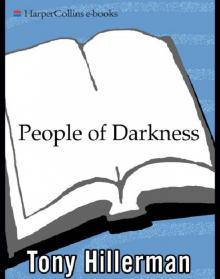 People of Darkness
People of Darkness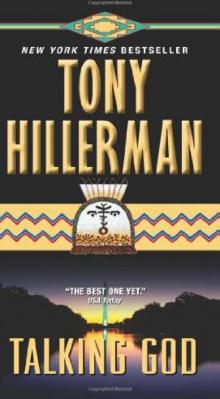 Talking God jlajc-9
Talking God jlajc-9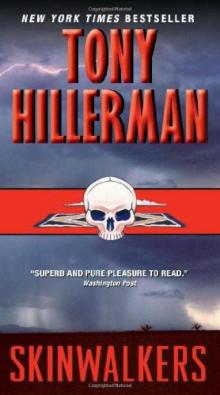 Skinwalkers jlajc-7
Skinwalkers jlajc-7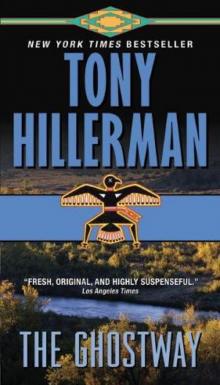 The Ghostway jlajc-6
The Ghostway jlajc-6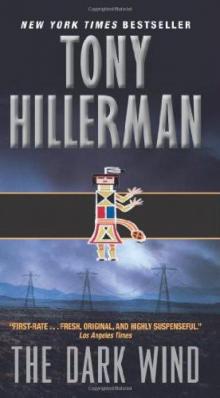 The Dark Wind jlajc-5
The Dark Wind jlajc-5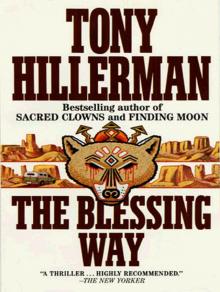 The Blessing Way
The Blessing Way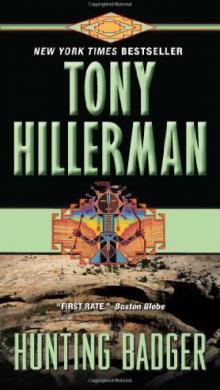 Hunting Badger jlajc-14
Hunting Badger jlajc-14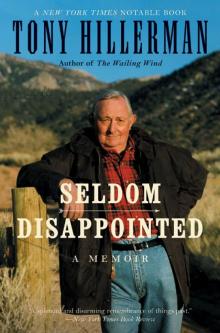 Seldom Disappointed: A Memoir
Seldom Disappointed: A Memoir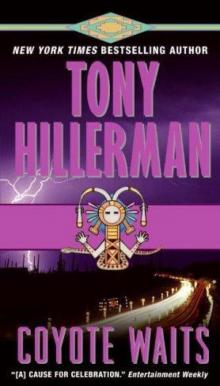 Coyote Waits jlajc-10
Coyote Waits jlajc-10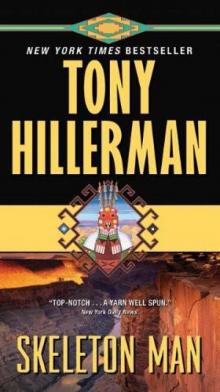 Skeleton Man jlajc-17
Skeleton Man jlajc-17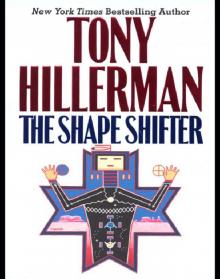 The Shape Shifter
The Shape Shifter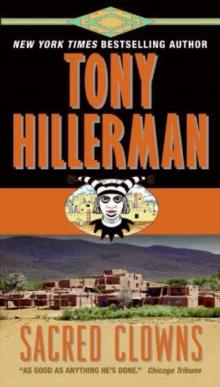 Sacred Clowns jlajc-11
Sacred Clowns jlajc-11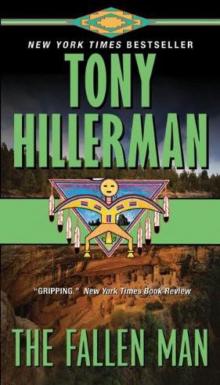 The Fallen Man jlajc-12
The Fallen Man jlajc-12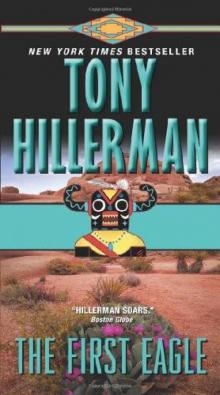 The First Eagle jlajc-13
The First Eagle jlajc-13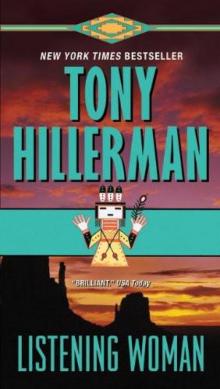 Listening Woman jlajc-3
Listening Woman jlajc-3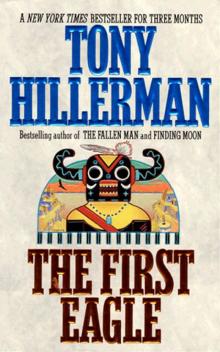 The First Eagle
The First Eagle Skeleton Man
Skeleton Man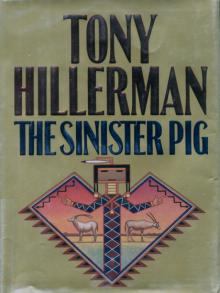 The Sinister Pig jlajc-16
The Sinister Pig jlajc-16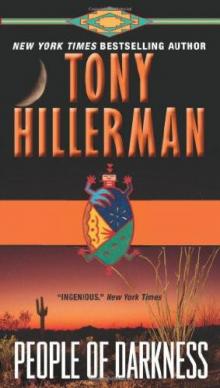 People of Darkness jlajc-4
People of Darkness jlajc-4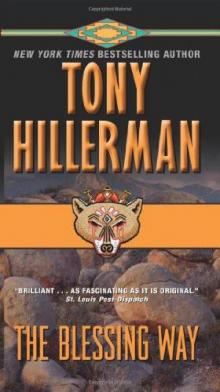 The Blessing Way jlajc-1
The Blessing Way jlajc-1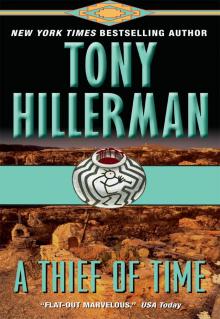 A Thief of Time
A Thief of Time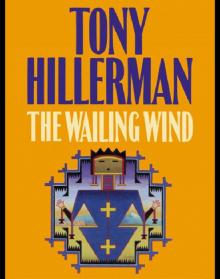 The Wailing Wind
The Wailing Wind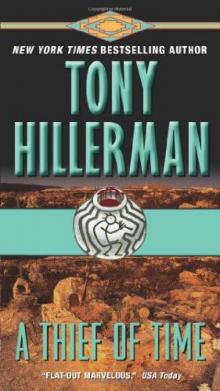 A Thief of Time jlajc-8
A Thief of Time jlajc-8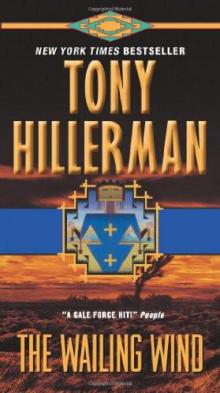 The Wailing Wind jlajc-15
The Wailing Wind jlajc-15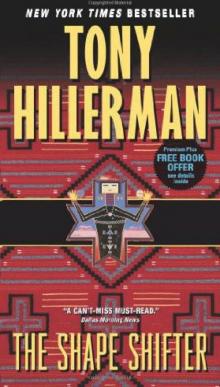 The Shape Shifter jlajc-18
The Shape Shifter jlajc-18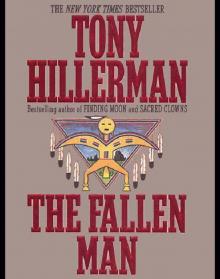 The Fallen Man
The Fallen Man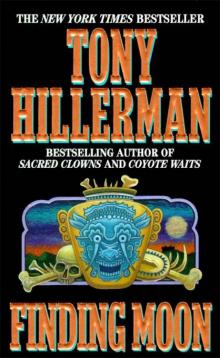 Finding Moon
Finding Moon